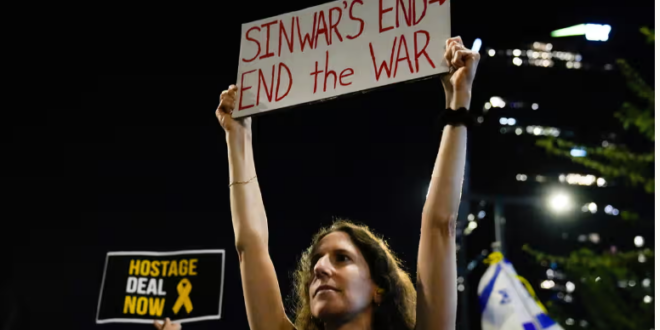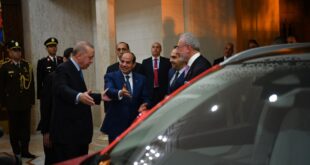Muhamad Yehia
The Israeli military’s announcement that it has killed the Hamas leader Yahya Sinwar should be an opportunity to end the devastating war in Gaza that has killed tens of thousands of Palestinian men, women and children. The death of the man who masterminded the 7 October massacres in southern Israel that killed more than 1,200 people would mark a key moment in the conflict. It could renew momentum for a ceasefire deal and hostage release – as families of those held have demanded. With the group’s two other key figures already dead, Benjamin Netanyahu could declare victory.
There is no sign that he is prepared to do so without intense and sustained pressure on him – the sort of pressure that the US has repeatedly been unwilling to exert. Mr Netanyahu knows that protracting conflict extends his political life. It seems more likely that he will vow that it’s time to finish the job. The Israeli prime minister said last month’s killing of Hassan Nasrallah, the leader of Hezbollah, had “settled the score”, and his approval ratings rose. Then Israel launched its ground offensive in Lebanon.
Yet as attention moved to the northern front, the conflict in Gaza intensified. The horror of seeing the teenager Shaban al-Dalou burned to death due to an Israeli strike on a hospital compound seized international attention. But many more face deaths no less cruel. The UN says that 345,000 people face “catastrophic” levels of hunger in the coming months, and almost all of the 2 million population face “acute food insecurity”, with barely any food entering in the last fortnight.
This looks like “the generals’ plan” – a blueprint for human rights violations drawn up by retired military figures. Mr Netanyahu said he was considering it, and both human rights groups and Israeli personnel say that they believe it is already under way. It calls for the besieging of northern Gaza; all civilians would be told to leave and the military would assume that those remaining were terrorists and cut off all supplies. In the longer term, ministers have already called for the Jewish settlement of Gaza.
You cannot evade the demands of international law to protect civilians by arbitrarily designating them as combatants. For a year, families have been forced from one place to another, only to find further danger. Mr Dalou’s family had been displaced at least five times before his death. “We’re stuck in a never‑ending nightmare,” he wrote earlier this year
The US has issued arguably its starkest warning yet to Israel, making clear that arms transfers could be withheld if it did not allow more aid into northern Gaza. Linda Thomas-Greenfield, the US ambassador to the United Nations, told the security council that a “quote-unquote ‘policy of starvation’ … would be horrific and unacceptable”. Yet every time the US lays down a marker, Israel ignores it – and the US continues to supply both arms and diplomatic cover. The deadline set by Washington expires after the US election. Perhaps as an outgoing president, Joe Biden might rethink his unabating support for Israel. But he has shown no signs of it so far – and the people of Gaza cannot wait.
The resumption and acceleration of aid flows are crucial but insufficient. People are not only hungry, malnourished and ailing but exhausted and traumatised. A ceasefire and hostage release deal is no less essential for its current unlikelihood. Pressure from European nations might encourage the US to do the right thing. They should include not only a halt to arms supplies but also the imposition of sanctions on Mr Netanyahu’s extremist coalition partners Itamar Ben-Gvir and Bezalel Smotrich, who said it might be “just and moral” to starve Palestinians in Gaza until hostages were released. This opportunity must not be ignored
The conflict in the Middle East continues to destroy countless lives. The scenes since 7 October from Gaza and Israel have haunted millions around the world and the crisis is being felt with an increasing intensity in Lebanon and the West Bank.
As the war reaches a new stage, understanding what is happening – and what comes next – is more important than ever.
With correspondents on the ground and reporters providing live updates around the clock, the Guardian is well-placed to provide comprehensive, fact-checked reporting, to help all of us make sense of a terrible war which has already reshaped global politics.
 موقع وجه أفريقيا موقع وجه أفريقيا هو موقع مهتم بمتابعة التطورات في القارة الأفريقية
موقع وجه أفريقيا موقع وجه أفريقيا هو موقع مهتم بمتابعة التطورات في القارة الأفريقية



